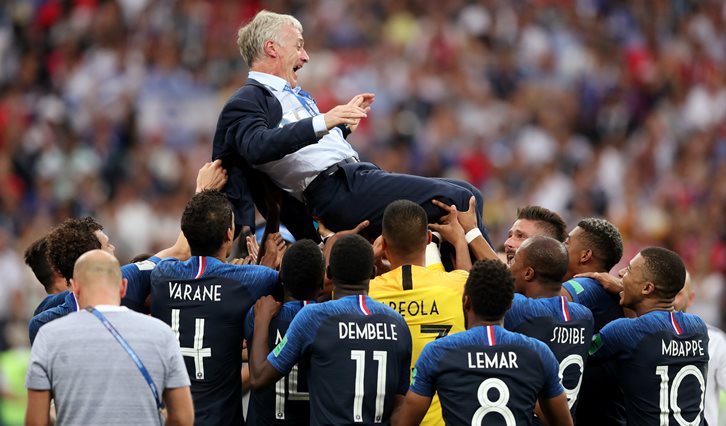What started as a World Cup with all the confederations represented has ended of looking more Euro than World. It ended like a European Cup with only two South Americans teams, Brazil and Uruguay, in the Round of 8 and an exclusive club of Euro members, Belgium, Croatia, England and France, in the Round of 4.
This resembled the 2006 edition of the tournament hosted by Germany where only Argentina and Brazil made it into the Last 8 with six European countries followed by an exclusive club of Euro members, France, Germany, Italy and Portugal, in the Round of 4.
The same happened 20 years ago in France where in the Last 8, we had only Argentina and Brazil from outside of Europe. In that year, Brazil, who were defending champions, managed to go all the way and lost to hosts, France in the final.
For the other three, hosted outside Europe, the scenario is completely different.
In Korea/Japan in 2002, there were four countries, Brazil, Korea Republic, Senegal and USA, in the Round of 8. Two of those, Brazil and Korea Republic, reached the semifinals and Brazil reached the final and won.
In South Africa in 2010, there were five countries, Argentina, Brazil, Ghana, Paraguay and Uruguay, in the Round of 8.Uruguay reached the semifinals and none reached the final, which was a contest between Netherlands and Spain.
In Brazil in 2014, there were four countries, Argentina, Brazil, Colombia and Costa Rica, in the Round of 8. Two reached the semifinals (Argentina and Brazil), and one reached the final, as Argentina lost to Germany.
At the end, with this FIFA World Cup, one cannot help but see it as Euro Cup Russia 2018, with six of eight teams in the Round of 8, coming from Uefa. As if to repeat what happened in German in 2006, four out of four in the Round of 4 (semifinals) were all Uefa member countries.
The European season drawback
The long European Season was a big factor in the World Cup and it, to a very large extent, decided the outcome of this tournament. All players who are consistently competing for the top clubs that reach the club competition finals in their respective countries, including the Champions League and Europa, struggled to cope with the demands of the competition.
They were fatigued and this was too obvious to ignore. Unless and until FIFA does something about these leagues, the FIFA World Cup will continue to be second grade to the Uefa Champions League.
Just to shed some light on this aspect by way of examples, the FIFA World Cup kicked off on Thursday, 14 June 2018.
This was exactly one month since the last game of the Bundesliga and the English Premier League. The EPL had started on August 11, 2017. As if that was not enough, their FA cups, were still to play, both on the Saturday, 19 May.
Then you had the Europa Cup on May 16, followed by the Uefa Champions League Cup Final on the 26th May 2018. This was 18 days before the kick off in Russia.
This only contributes to bringing “fatigued” top players to the World Cup. The national teams that were dominated by top players who play for top club teams performed below their expected level in this World Cup in Russia. It would not be true that “small countries” have improved.
Improvement is performance. It is not winning a match, at times after defending for 120 minutes and getting the results from spot kicks or from penalties.
Added to this fact, with the failure of Argentina and Mexico to top their groups, this meant that we had one side of the draw loaded with teams from all over the world and one loaded with teams from Europe, save for one – Colombia (7 UEFA and 1 CONMEBOL).
As was indicated in the preview, the champions were always going to be a team that meets all three criteria- having a strong national playing philosophy, quality players and the star. Even though – due to some teams falling short of expectations – there were some surprise teams that reached the last rounds, it was never going to be possible for any team not meeting the criteria to lift the cup.
Once the 16 teams had qualified, it was always possible that, depending on the fixtures, Croatia would reach the final. They were almost handed the slot in the final though they made heavy weather of the situation.
Set Plays factor
While it is commendable that some of these were well executed and resulted in goals, it was disappointing that some teams would only rely on these situations to score goals. This was particularly the case with teams from Europe. As such, where they played each other, only from these situations would the goals come, mainly. That is a cause for concern. Teams should be able to create and score goals.
The Sad African Story
This one is well documented in the follow-up article, The Beginning of the World Cup. The African countries do not feature here as they did not make the Round of 16.
Maybe CAF knew something that we didn’t.
How is it that the FIFA World Cup ends on Sunday 15 July, 2018, in Russia and CAF Champions League resumes on Tuesday 17 July, 2018? Makes you wonder!
Zooming in on France
While their Starting 11 in the final had only one French-based player, Kylian Mbappe, it is important to notice that all, but two, Lucas Hernandes and Paul Pogba who last played in France in the U-19 for Le Havre, started playing their professional football in France. This is significant as the consolidation of the national playing philosophy is completed at the end of the players’ development from youth to senior/professional level. One can only wonder how many other teams in this 21st edition have the same set-up.
Croatia, while they are a small country have also similar progression in their country. This team did not reach the final by chance. It was a reward of hard work over a period of time from a constraint population of four million. They may not be able to sustain the success, but will definitely continue to be a force to be reckoned with, at least for some time to come. This success will give them the motivation required to do even more in their youth structures. The fact that a country that small can provide the world with outstanding players like Modric, Rakatic, Mandzukic, Perisic as examples just like Uruguay with three million who provide the world with players like Cavani, Suarez – who will forget Diego Forlan – is something to be appreciated.
Here are countries with limited numbers – and definitely in the case of Uruguay – and limited resources too but are able to hold their own against the world. This is a lesson for all who want to progress and be counted in the future.
The Starting 11 for the final had one U20, five U25, two 27-year-olds and three 31-year-olds. This says a lot about their youth football and the confidence they have in their young players.
On the criteria, as was given in the preview to win this World Cup, they would have shown the following:
- National Playing Philosophy
France may not have a very well defined playing philosophy (at least not at a level of Spain, Germany, nor even Japan), but they are able to understand one another as they were all developed in the same approach to the game.
Teams like Brazil, who can no longer have a strong and well defined identity, due to their players scattered all over earlier in their careers, can no longer compete equally with those who have the same, but play together for the longer time
It is commendable that in the Starting 11 of the French team in the final on Sunday, six players were in the starting 11 at the Euro 16. Those are Hugo Lloris, Samuel Umtiti, Paul Pogba, Blaise Matuidi, Antoine Griezman and Olivier Giroud. This is indeed a clear indicator of a well-planned process, rather than an erratic sequence of events. This is a very experienced team in cup finals on the international stage.
- Quality of Players
They have very good players. They were able to replace the players on the field with almost the same level from the substitutions. Each one is capable to do all in their functional areas. That is why Benjamin Pavard (22) scored from open play from right back.
- Star(s)
They have not one, but more. Pogba was always going to stand out. Mbappe showed his individuality and so was Griezman. The goals that Pogba and Mbappe scored in the final showed what these two players are capable of.
While the team did not have rhythm, nor had the ball, whenever they got it, they were lethal and devastating. This was mainly because of the extra ability that these two/three together with others could do. This factor aided France to be crowned champions.
In 1998, they had Zidane. This time they had more than one star.
In this aspect, we had Eden Hazard for Belgium, taking bronze and scoring in the last game (a solo goal-of high quality)
In the final, we still saw Modric and Rakatic, though both tired, for Croatia and of course Pogba and Mbappe for France, who both scored. This is a big factor in today’s football at the highest level.
Teams that are very good and well organised, but did not have this kind of a player (or do not believe in creating space for such a player), fell by the way. Sweden, Denmark, Japan, are some of those examples.
Croatia, in their Starting 11, had two U25, three 29-year-olds and one 26-year-old as well as five 30 and over.
There were three important factors that prevailed against Croatia in the final:
- Croatia had older players in their Starting 11 compared to the French opponents. The difference on average was 3 years. France had 26 against Croatia’s 29. With congested fixtures as in the World Cup, it makes a big difference. One may ask Argentina.
- Croatia had three days between their last game and the final while France had four.
- The last and most crucial (as this was as a result of Croatia’s own making), they had played one game extra than France. This was as a result of them playing 3 x 30 minutes of extra time-in each round of the knockout stage.
These factors, combined, made the difference both psychologically and physically. At this level, and with so few days between matches, these extra 30 minutes were always going to count against Croatia, and indeed, they did. It was not a surprise for some of us who already expected and avalanche of goals against Croatia, to see what happened. It could have easily been worse.
At certain moments, especially in the last 30 minutes, one could see the slow reactions from the Croats. It was not easy for them to react. There were situations where France scored (and could have scored) that were a direct result of opponent’s fatigue. This was besides those from the individual actions of “special” French players. The one opportunity from a free kick that Pogba missed was a result of mental blocks that prevailed in the Croats defensive organisation. It could easily have been worse.
The sad reality (for those who have not started) is that France won the World Cup with a team that can still play in Qatar. This should worry anyone who harbours ambitions of doing well in Qatar. Not that they will defend it successfully (as recent history would confirm). However, given that their team will be players who would have matured rather than predictable, they may change this history. Even if they do not, if you have players their age who were not at this world cup, you have every reason to be concerned even worried about your prospects in Qatar.
France had Mbappe (19), Brazil had Jesus (21), Nigeria has Uzoho (19), all in the starting 11! The question is do you have players this age in your country to match these?
From the Starting 11 in the final, Giroud, Matuidi and Goalkeeper Lloris will be 35. The rest will be 31 and under. Mbappe would still be 23 (and playing in his second World Cup).
This is why the only way to have a chance to do well in the FIFA World Cup is to focus on youth football and its development. This has to be done in the whole country. Doing something in selected areas only gives part benefits.
Unless and until the whole country is treated in the same way, there can be no rewards at the highest level. This is why countries with small populations like Uruguay (3 million), Croatia (4 million), just to mention two, will continue to flex their muscle because they take care of all their people when it comes to youth football development. Possibly, due to limited numbers, they cannot afford to be selective.
Countries who wouldn’t believe in the concept of the star and continue to believe that all players should do everything in the same way, have become predictable, unenterprising and would only score from set plays. With all the analysis and preparation that deal with all aspects of the opponent, the only factor left is the individual creativity/improvisation/intelligence – the genius. This is one factor that will remain un-interpreted as even the player him/herself may not tell you what he/she will do come a situation.
With all the facilities available, none can read the mind of a genius.
We can only look forward to Qatar, come 2022!
By Ziphozonke Dlangalala






